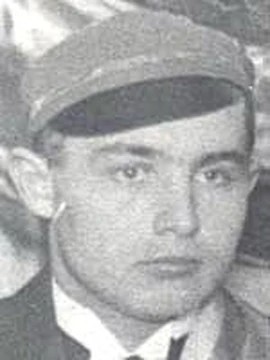Bogdan wurde in der Stadt Posen (Polnisch: Poznań) geboren, das damals zum Deutschen Reich gehörte. Aus diesem Grund beherrschte er die deutsche Sprache perfekt, was ihm während seines Aufenthaltes im Lager sehr nützlich sein sollte. Nachdem er im August 1940 von den Deutschen verhaftet worden war, wurde er in das Fort VII gebracht, das als Gefängnis und Konzentrationslager diente. Dort wurden etwa 20.000 Menschen ermordet, was ungefähr der Hälfte der dort untergebrachten Häftlinge entsprach.
Suchowiak blieb nur kurze Zeit im Fort, denn nach wenigen Tagen wurde er in das Lager Buchenwald gebracht. Das Lager in der Nähe von Weimar war ebenfalls ein Ort der vorübergehenden Inhaftierung für den Polen. Nach einigen Monaten, im Dezember 1940, wurde Bogdan Suchowiak in das 13 km von Hamburg entfernt gelegene Konzentrationslager Neuengamme gebracht. Bei seiner Ankunft erhielt er die Nummer 3524. Deutsch- und Englischkenntnisse und die Tatsache, dass Suchowiak Maschinenbauingenieur war - wie er sich selbst erinnerte:
erleichterten es mir nicht nur, die langen Jahre des Lagers zu überstehen, sondern gaben mir auch - im Vergleich zu anderen Häftlingen - eine viel größere Chance, Informationen über aktuelle politische Ereignisse und militärische Aktivitäten zu erhalten.
Die Häftlinge des Lagers wurden zur Arbeit in der Ziegelproduktion und in der ersten Phase des Kanalbaus eingesetzt. In diesem Bereich wurden die meisten der ins Lager eingewiesenen Polen eingesetzt. Suchowiak beschrieb die Art der Arbeit beim Kanalbau wie folgt:
Die Arbeit dort war grausam. Mit einer Schaufel in der Hand oder beim Schieben einer Schubkarre voller Schlamm oder Sand mussten die Häftlinge mit durchnässten Hosenbeinen und in windgefütterter Kleidung von morgens bis abends arbeiten.
Im Jahr 1945 wurde das Lager evakuiert. Bogdan Suchowiak, der vorgab, krank zu sein, blieb im Lagerkrankenhaus. Da er wusste, dass sich alliierte Soldaten von Westen her näherten, blieb er im Lager und hoffte, dass er bald seine Freiheit wiedererlangen würde. Am 21. April 1945 beschlossen die Deutschen jedoch, auch dieses Gebäude zu evakuieren. Die Kranken, die sich nicht selbständig bewegen konnten, wurden getötet, der Rest wurde in Richtung Lübeck getrieben. Nach zwei Tagen wurde Suchowiak zusammen mit dem gesamten Transport auf das Schiff "Thielbeck" verladen:
Es gibt keine Bedingungen für den Transport von Menschen. Die Ladeluken, die sich mindestens 10 Meter unter dem Deck befinden, werden zu unserem Raum (...) es herrscht schreckliche Enge und das Fehlen primitivster sanitärer Bedingungen (...) anstelle von Toiletten werden Fässer verwendet, die von Schiffskränen über die Köpfe der Gefangenen gezogen werden, und ihr Inhalt wird den Menschen beim Herausziehen auf den Kopf geschüttet.
"Thielbeck" wurde, wie auch "Cap Arcona", von der britischen Luftwaffe bombardiert.
Eines der Flugzeuge feuert eine Rakete ab, die das Schiff trifft und die Bordwand durchschlägt (...) Die "Thielbeck" nimmt Wasser auf und schüttelt sich. Die Panik ist auf dem Höhepunkt. Tausende von Gefangenen versuchen, aus den unteren Luken zu entkommen, als ob sie in eine Falle geraten wären. Nur vier Leitern geben Tausenden von Menschen kaum eine Chance. Diejenigen, die sie erreichen, werden von anderen hinuntergestoßen und gezogen.
Sobald Suchowiak im Wasser war, schwamm er in Richtung Ufer.
Ich bin mindestens einen Kilometer lang in guter Form geschwommen. So bin ich etwa 2 Stunden lang geschwommen. Meine Beine waren steif. Manchmal schien es, als würde ich nicht meine eigenen Gliedmaßen, sondern irgendwelche Fremdkörper bewegen.
Er schaffte es, zu seinem Ziel zu schwimmen. Er erlangte seine Freiheit zurück. Seine Reaktion darauf war bezeichnend:
Es ist schwer, meine Freude zu beschreiben! Ich habe gewonnen, mein Leben gerettet, mein Ziel erreicht und im entscheidenden Kampf eine gute Kondition bewiesen. Ich hatte den Septemberfeldzug [1939] hinter mir, die Gefangenschaft, die Flucht aus der Gefangenschaft und siebenundfünfzig Monate, die ich in Gefängnissen und Konzentrationslagern der Nazi-Gestapo verbracht hatte. Und doch - im entscheidenden Moment, um mich zu retten, fühlte ich mich jung und stark und beschloss, um mein Leben zu kämpfen.
